In the context of increasingly strong renewable energy development, electricity storage and optimization has become an important factor for households, businesses and even large industrial projects. Battery Energy Storage System (BESS) has proven to be a key factor in improving electricity efficiency, reducing pressure on the grid and providing reliable backup power.
Thanks to its flexibility and scalability, BESS solutions meet the needs of small-scale residential to commercial-industrial (C&I) projects and electric utilities.
What is BESS battery energy storage system?
Battery Energy Storage Systems (BESS) are devices that store excess electricity from energy sources such as solar, wind or the traditional grid, and release it when demand increases. This not only helps optimize energy use but also supports the transition to cleaner energy more efficiently.
A standard BESS system includes batteries, PCS power converters, EMS energy management systems, fire safety solutions, remote monitoring and control. When operating, this system ensures voltage stability, load balancing and increases equipment life.
Not only does it store energy, BESS also helps balance the grid. When renewable energy sources fluctuate, the battery system acts as a “smart buffer”, charging when there is excess power and discharging when demand increases. As a result, voltage and frequency are always maintained stably, reducing the risk of sudden power outages, ensuring continuity of operations for both households and businesses.

>>See more: Learn about the BESS C&I energy storage battery system
Operating mechanism of BESS energy storage battery system
– Energy acquisition and charging mechanism
Battery storage systems are designed to receive electricity from a variety of sources, most commonly renewable energy sources such as solar power or grid power. When electricity production exceeds demand, such as at noon or during off-peak hours, the system automatically switches to charging mode to store the excess electricity.
During the charging phase, the inverter plays a central role in converting alternating current (AC) into direct current (DC) suitable for battery charging. At the same time, the energy management software records data and optimizes charging time to ensure battery life and operating efficiency.
– Discharge and supply power when needed
When the demand for electricity increases, especially during peak hours or in cases where renewable energy sources are interrupted, the energy storage battery system will automatically switch to discharge mode. At that time, the energy accumulated in the battery will be returned to the load system or the grid.
The inverter continues to convert DC current into AC, ensuring stable output power, meeting technical standards and fully meeting usage needs. Thanks to this mechanism, users can reduce peak hour electricity costs and maintain continuous power supply even when the production source has problems.
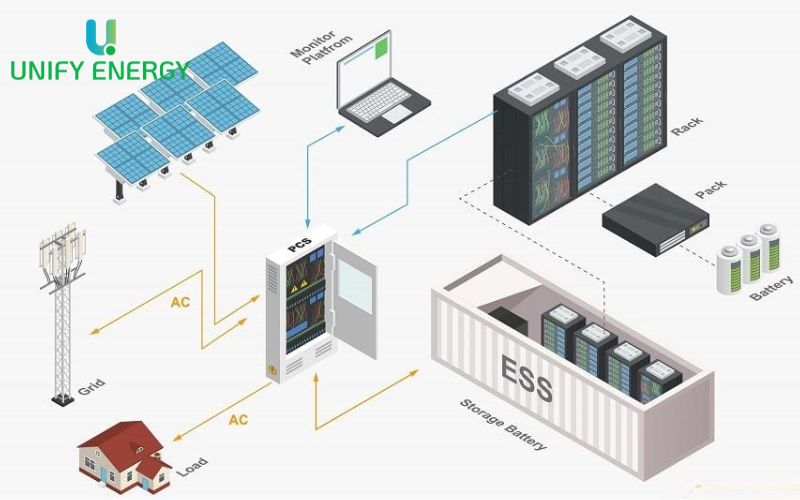
Types of energy storage battery systems today
Energy storage systems are classified based on their size, intended use, and integrated features. With the goal of optimizing user experience, they can be classified into two main groups: Residential BESS, C&I BESS.
BESS Residential is designed for households, apartments and smart homes. The system connects easily to rooftop solar panels, providing backup power and optimizing electricity bills. Its strengths are compactness, easy installation and simple operation. Users can manage smart energy via a mobile app, monitor battery status, schedule discharges and monitor the system remotely.
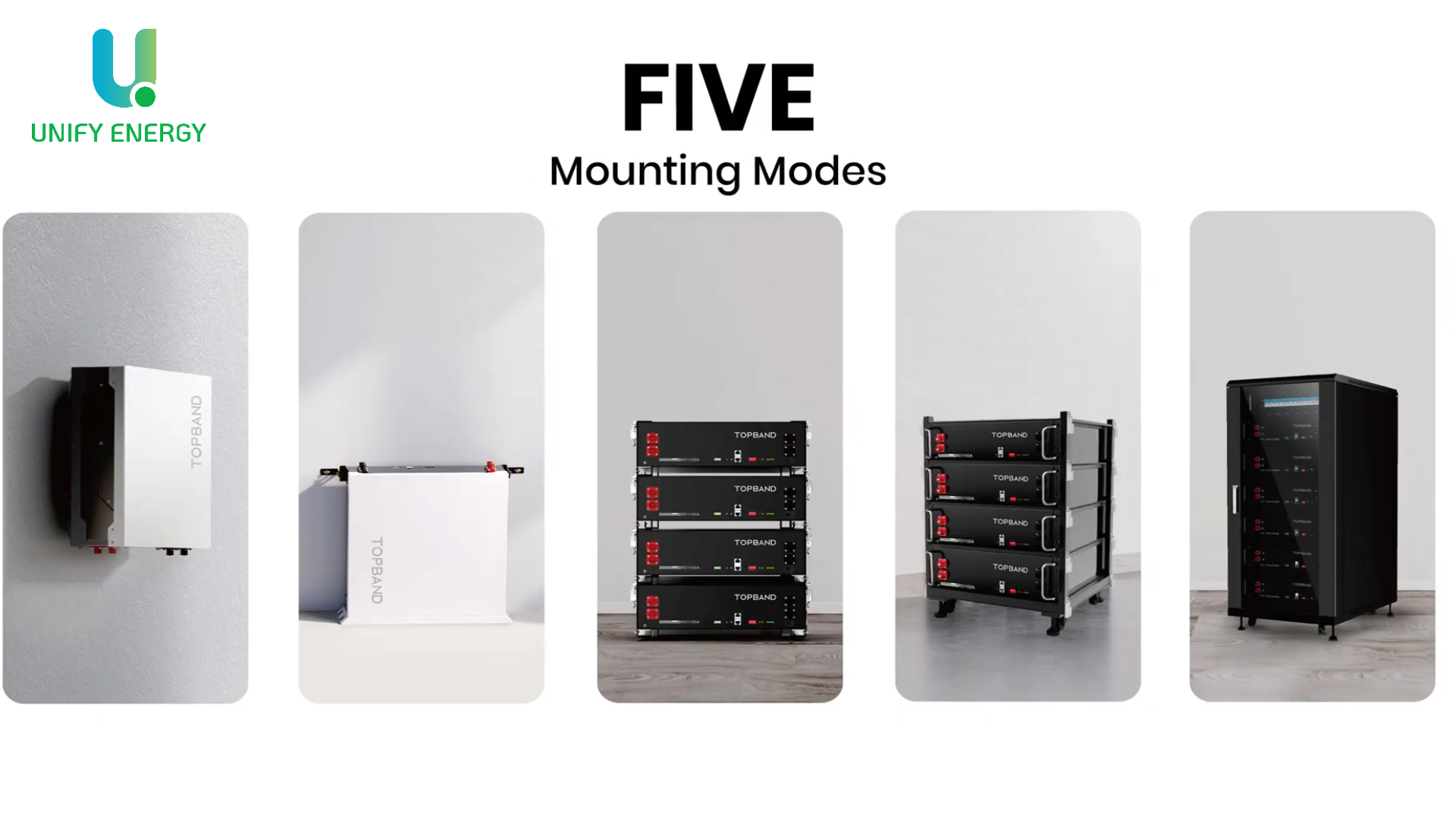
>>See more: BESS civil energy storage battery system product lines
Meanwhile, BESS C&I serves commercial and industrial needs. The system integrates advanced functions such as frequency regulation, uneven load balancing and flexible connection to renewable energy sources. As a result, businesses can optimize production, reduce peak-hour electricity costs and improve the stability of critical equipment in factories or data centers.

Outstanding technology of energy storage battery system
Current BESS battery storage system products such as Topband 215 kWh and 261 kWh not only integrate batteries, PCS and EMS, but also include fire protection, security and temperature control devices. The modular design makes it easy to expand and upgrade according to needs, from small residential projects to data centers, commercial buildings or solar and wind hybrid systems.
The PCS converter uses state-of-the-art silicon carbide (SiC) semiconductors, which provide low-loss power conversion, long life, and superior performance. The intelligent liquid cooling system maintains a stable temperature, reduces internal losses, and prolongs battery life. At the same time, the multi-layer protection system ensures safe operation against risks such as short circuit, overload, or temperature failure.
Additionally, BESS Topband systems are equipped with a cloud-connected EMS, allowing for remote monitoring, data analysis, and firmware updates. Users can manage the system via a mobile app or web interface, minimizing downtime and optimizing operating costs.
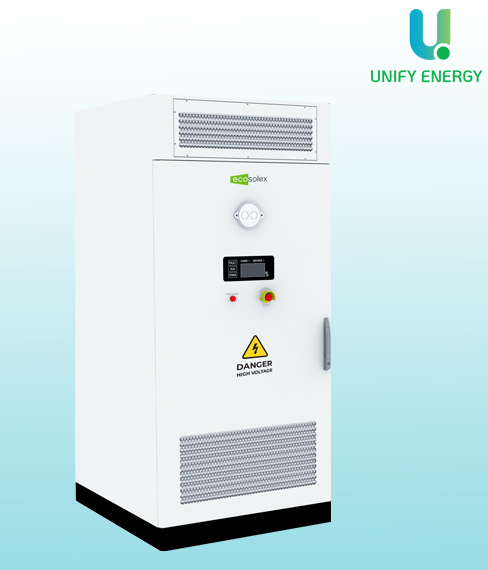
>>Watch video: Introducing Unify Energy’s BESS Topband EcoSolex 215KWh energy storage battery system
Outstanding benefits of BESS energy storage battery system
BESS battery energy storage systems are becoming an essential solution in optimizing energy, reducing operating costs and increasing sustainability for households, businesses and industrial projects. Not only an electricity storage device, BESS is also a smart energy management tool, helping to balance electricity supply and demand, stabilize the power grid and reduce greenhouse gas emissions.
Below are the outstanding benefits that BESS battery energy storage systems bring:
Efficient integration of renewable energy
One of the biggest advantages of BESS battery energy storage systems is the ability to integrate and optimize renewable energy sources. Excess electricity from solar energy sources is often unstable over time, making it difficult to maintain balance in the grid. BESS helps solve this problem by storing excess energy when production exceeds demand and releasing it when demand increases or when renewable energy sources decrease.
Thanks to this ability, the battery storage system acts as a smart energy buffer, helping to reduce electricity waste and increase the rate of clean energy use. This not only helps businesses, commercial buildings or residential areas optimize electricity costs, but also supports the transition to green energy, towards the goal of sustainable development.
Using Battery Energy Storage Systems also gives grid operators more flexibility in allocating and dispatching renewable energy, especially in areas with high demand but unstable power supply.
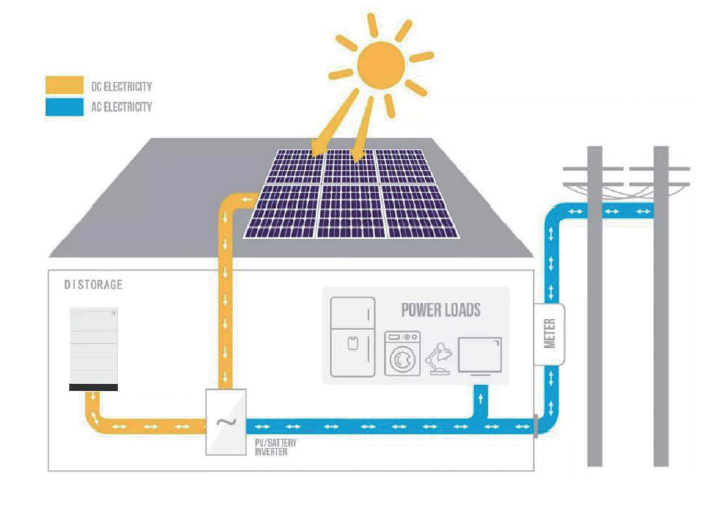
Stabilize the grid and reduce the risk of disruption
Another important benefit of a BESS battery energy storage system is its ability to stabilize the grid. When renewable energy sources fluctuate, the BESS system stores excess electricity during periods of high production and releases it when demand is high. This helps to balance voltage, regulate frequency, and minimize the risk of overloads or blackouts.
Especially in harsh weather conditions, businesses and households are guaranteed a stable power supply. Thanks to that, the BESS energy storage battery system not only improves operational efficiency but also protects important electrical equipment. For data centers, industrial plants or commercial buildings, BESS becomes an important solution to maintain continuity in production and business, while optimizing grid management costs.
Reduce emissions and save electricity during peak hours
One of the key benefits of BESS battery energy storage systems is their ability to reduce greenhouse gas emissions. Large power plants often operate inefficiently during peak demand hours, emitting large amounts of CO₂ and other greenhouse gases. By storing excess energy during off-peak hours and using it when demand is high, BESS helps reduce dependence on conventional power plants.
This system not only saves electricity costs but also plays an important role in protecting the environment. Emission reduction contributes significantly to national and global clean energy goals. At the same time, thanks to its intelligent power management capabilities, the BESS battery energy storage system also helps users predict and optimize the timing of discharge, reducing operating costs and increasing overall energy efficiency.

Provide backup power
In the context of the transition from fossil fuels to renewable fuels in the industrial, transportation and daily life sectors, the BESS battery energy storage system has become an indispensable tool. This system provides reliable backup energy in case of sudden power outages, ensuring that important equipment always operates continuously.
This is especially important for businesses, data centers, healthcare facilities or commercial buildings where power outages can lead to economic losses and operational disruption. BESS enables power systems to maintain high reliability, improve sustainability and proactive energy management, and support more efficient electrification.
Enhance automation and smart energy management
In addition to the benefits of power storage and supply, the BESS battery energy storage system also supports increased energy automation. The system is combined with EMS energy management software, which helps monitor battery status, discharge/charge time and analyze energy consumption data.
This allows users to optimally plan their energy storage and discharge, reducing their dependence on the grid and improving their energy self-sufficiency. BESS helps households and businesses make the most of renewable energy, save on electricity costs, improve operational efficiency and support the transition to sustainable energy. This integrated smart management optimizes battery lifecycles and increases the long-term investment value of energy projects.
Economic problems when using BESS energy storage battery system
For medium and large commercial and industrial enterprises, BESS battery energy storage systems are becoming an optimal solution to manage electricity costs and increase energy autonomy. The initial investment cost depends on the system size, PCS inverter capacity, battery type and EMS energy management solution.
For example, a medium-sized business using about 500 kWh of electricity per day can consider installing a BESS with a capacity of 200–300 kWh. The total investment cost for this system in Vietnam can range from several hundred million to over one billion VND, depending on the configuration, LiFePO₄ battery type and the level of integration of safety devices and EMS. This investment level is suitable for businesses that need to reduce peak hour electricity costs and improve operational efficiency.
By using BESS to store electricity during off-peak hours (maximizing cheap electricity or excess solar power) and discharge it during peak hours, businesses can significantly reduce their monthly electricity costs. In the above example, if peak electricity prices increase by about 30–50% compared to off-peak hours, using BESS can help save 10–20% on electricity bills each month, equivalent to several tens of millions of VND/year for medium-sized businesses.
The payback period (ROI) of a BESS C&I system of this type is usually around 5–7 years, depending on the level of renewable energy self-consumption, local electricity prices and the electricity load characteristics of the business. If the business has a solar roof with an output of 300–400 kWh/day, the ROI period can be shortened to around 4–5 years, by taking advantage of renewable energy sources to reduce grid electricity purchases during peak hours.
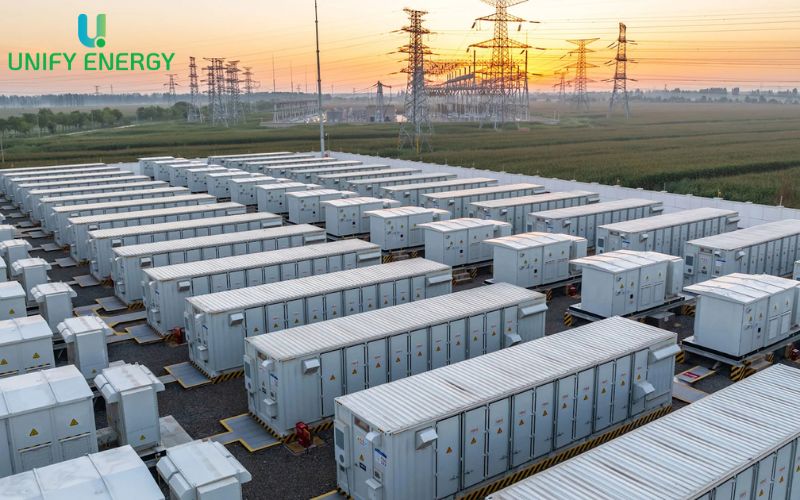
In addition to cost savings, BESS also acts as a power backup in the event of a power outage. For manufacturing businesses or data centers, avoiding downtime can save hundreds of millions of dollars in damage each year. This is an intangible but extremely important benefit that goes far beyond the mere value of saving electricity.
In summary, although the initial investment of BESS can be a large expense, with peak power savings, reduced risk of interruption and utilization of renewable energy, and a reasonable payback period, this solution is truly a long-term strategy for C&I businesses looking to manage energy effectively.
Unify Energy – Official distributor of Topband’s BESS energy storage battery system in Vietnam
In the context of the increasingly urgent need to optimize power, ensure energy safety and reduce operating costs, choosing a quality, durable and efficient energy storage battery system is extremely important. Topband – one of the world’s leading manufacturers of LFP batteries and BESS energy storage battery systems has affirmed its international position with more than 11,600 employees, 14 R&D centers and annual revenue exceeding 1.5 billion USD.
As the official distributor of Topband in Vietnam, Unify Energy brings customers a genuine line of energy storage battery systems, ensuring international standards and optimal operation according to each usage need. Not only providing hardware equipment, Unify Energy also deploys a complete solution including: technical consulting, system design, construction and installation, configuration – operation and periodic maintenance.
It is the synchronization in service that helps customers feel secure about the performance, safety, energy saving ability and longevity of the BESS system throughout the project life cycle.

Unify Energy currently provides a full range of products from residential BESS, large-capacity C&I BESS, suitable for households, manufacturing enterprises, commercial buildings, data centers, electric vehicle charging stations and industrial rooftop solar power projects. With diverse implementation experience and a team of technical experts with in-depth knowledge of energy storage, Unify Energy is a reliable address to help customers optimize electricity costs, improve power quality and increase energy autonomy.
>> For detailed advice on energy storage battery system solutions, please contact Hotline: 0968 987 880 to receive technical support and quick quotes.
>>See more: Unify Energy officially becomes Topband’s strategic partner in Vietnam
Conclusion
It can be affirmed that the energy storage battery system is not only the optimal solution today, but also the strategic foundation for the future, when the demand for electricity continues to increase and businesses move towards a more sustainable, economical and safer operating model. Choosing Topband’s BESS through Unify Energy is a solid step for households, businesses and industries to seize the advantage in the journey of comprehensive energy transformation.
Frequently asked questions about BESS battery energy storage system
1. Is the BESS energy storage battery system safe?
The energy storage battery system is designed with multiple layers of protection against overload, overheating and short circuit, ensuring safe operation in homes and industries.
2. How long is the lifespan of the BESS energy storage battery system?
The lifespan of a BESS is usually 10-15 years depending on the battery technology, the number of charge-discharge cycles and the operating mode, ensuring long-term stable performance.
3. Is the BESS energy storage battery system easy to expand?
The energy storage battery system is designed in a modular manner, easy to expand according to needs, from households, businesses to large-scale industrial projects.








Leave a Reply